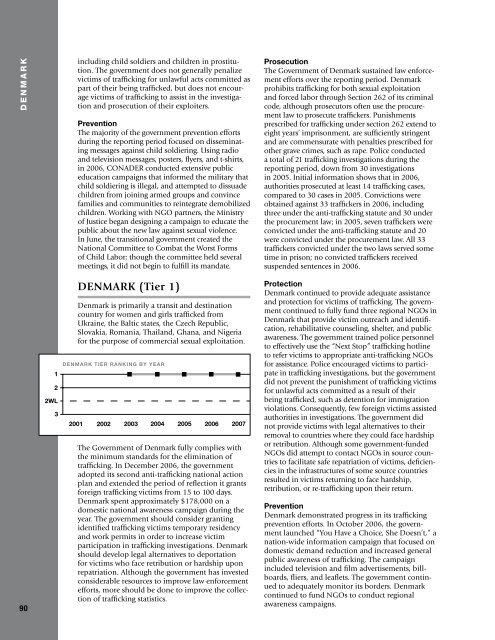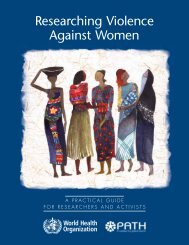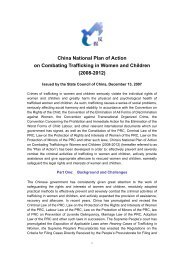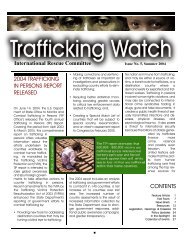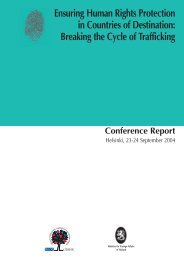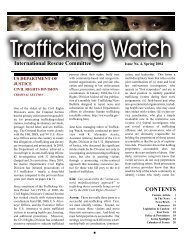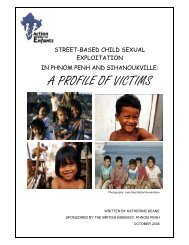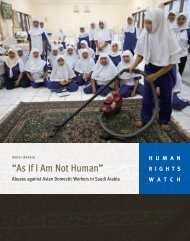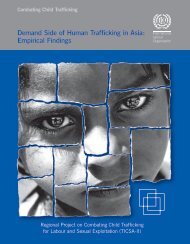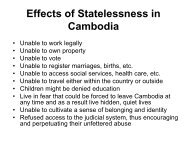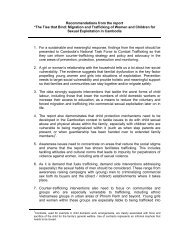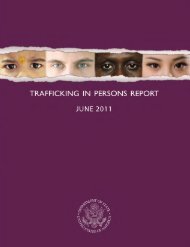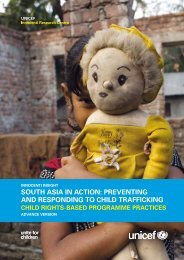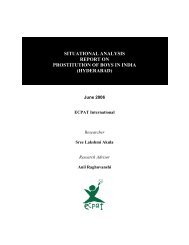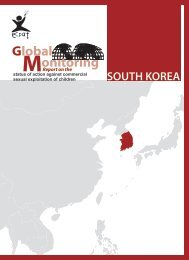2007 Trafficking in Persons Report - Center for Women Policy Studies
2007 Trafficking in Persons Report - Center for Women Policy Studies
2007 Trafficking in Persons Report - Center for Women Policy Studies
You also want an ePaper? Increase the reach of your titles
YUMPU automatically turns print PDFs into web optimized ePapers that Google loves.
D E N M A R K<br />
90<br />
<strong>in</strong>clud<strong>in</strong>g child soldiers and children <strong>in</strong> prostitution.<br />
The government does not generally penalize<br />
victims of traffick<strong>in</strong>g <strong>for</strong> unlawful acts committed as<br />
part of their be<strong>in</strong>g trafficked, but does not encourage<br />
victims of traffick<strong>in</strong>g to assist <strong>in</strong> the <strong>in</strong>vestigation<br />
and prosecution of their exploiters.<br />
Prevention<br />
The majority of the government prevention ef<strong>for</strong>ts<br />
dur<strong>in</strong>g the report<strong>in</strong>g period focused on dissem<strong>in</strong>at<strong>in</strong>g<br />
messages aga<strong>in</strong>st child soldier<strong>in</strong>g. Us<strong>in</strong>g radio<br />
and television messages, posters, flyers, and t-shirts,<br />
<strong>in</strong> 2006, CONADER conducted extensive public<br />
education campaigns that <strong>in</strong><strong>for</strong>med the military that<br />
child soldier<strong>in</strong>g is illegal, and attempted to dissuade<br />
children from jo<strong>in</strong><strong>in</strong>g armed groups and conv<strong>in</strong>ce<br />
families and communities to re<strong>in</strong>tegrate demobilized<br />
children. Work<strong>in</strong>g with NGO partners, the M<strong>in</strong>istry<br />
of Justice began design<strong>in</strong>g a campaign to educate the<br />
public about the new law aga<strong>in</strong>st sexual violence.<br />
In June, the transitional government created the<br />
National Committee to Combat the Worst Forms<br />
of Child Labor; though the committee held several<br />
meet<strong>in</strong>gs, it did not beg<strong>in</strong> to fulfill its mandate.<br />
DENMARK (Tier 1)<br />
Denmark is primarily a transit and dest<strong>in</strong>ation<br />
country <strong>for</strong> women and girls trafficked from<br />
Ukra<strong>in</strong>e, the Baltic states, the Czech Republic,<br />
Slovakia, Romania, Thailand, Ghana, and Nigeria<br />
<strong>for</strong> the purpose of commercial sexual exploitation.<br />
The Government of Denmark fully complies with<br />
the m<strong>in</strong>imum standards <strong>for</strong> the elim<strong>in</strong>ation of<br />
traffick<strong>in</strong>g. In December 2006, the government<br />
adopted its second anti-traffick<strong>in</strong>g national action<br />
plan and extended the period of reflection it grants<br />
<strong>for</strong>eign traffick<strong>in</strong>g victims from 15 to 100 days.<br />
Denmark spent approximately $178,000 on a<br />
domestic national awareness campaign dur<strong>in</strong>g the<br />
year. The government should consider grant<strong>in</strong>g<br />
identified traffick<strong>in</strong>g victims temporary residency<br />
and work permits <strong>in</strong> order to <strong>in</strong>crease victim<br />
participation <strong>in</strong> traffick<strong>in</strong>g <strong>in</strong>vestigations. Denmark<br />
should develop legal alternatives to deportation<br />
<strong>for</strong> victims who face retribution or hardship upon<br />
repatriation. Although the government has <strong>in</strong>vested<br />
considerable resources to improve law en<strong>for</strong>cement<br />
ef<strong>for</strong>ts, more should be done to improve the collection<br />
of traffick<strong>in</strong>g statistics.<br />
Prosecution<br />
The Government of Denmark susta<strong>in</strong>ed law en<strong>for</strong>cement<br />
ef<strong>for</strong>ts over the report<strong>in</strong>g period. Denmark<br />
prohibits traffick<strong>in</strong>g <strong>for</strong> both sexual exploitation<br />
and <strong>for</strong>ced labor through Section 262 of its crim<strong>in</strong>al<br />
code, although prosecutors often use the procurement<br />
law to prosecute traffickers. Punishments<br />
prescribed <strong>for</strong> traffick<strong>in</strong>g under section 262 extend to<br />
eight years’ imprisonment, are sufficiently str<strong>in</strong>gent<br />
and are commensurate with penalties prescribed <strong>for</strong><br />
other grave crimes, such as rape. Police conducted<br />
a total of 21 traffick<strong>in</strong>g <strong>in</strong>vestigations dur<strong>in</strong>g the<br />
report<strong>in</strong>g period, down from 30 <strong>in</strong>vestigations<br />
<strong>in</strong> 2005. Initial <strong>in</strong><strong>for</strong>mation shows that <strong>in</strong> 2006,<br />
authorities prosecuted at least 14 traffick<strong>in</strong>g cases,<br />
compared to 30 cases <strong>in</strong> 2005. Convictions were<br />
obta<strong>in</strong>ed aga<strong>in</strong>st 33 traffickers <strong>in</strong> 2006, <strong>in</strong>clud<strong>in</strong>g<br />
three under the anti-traffick<strong>in</strong>g statute and 30 under<br />
the procurement law; <strong>in</strong> 2005, seven traffickers were<br />
convicted under the anti-traffick<strong>in</strong>g statute and 20<br />
were convicted under the procurement law. All 33<br />
traffickers convicted under the two laws served some<br />
time <strong>in</strong> prison; no convicted traffickers received<br />
suspended sentences <strong>in</strong> 2006.<br />
Protection<br />
Denmark cont<strong>in</strong>ued to provide adequate assistance<br />
and protection <strong>for</strong> victims of traffick<strong>in</strong>g. The government<br />
cont<strong>in</strong>ued to fully fund three regional NGOs <strong>in</strong><br />
Denmark that provide victim outreach and identification,<br />
rehabilitative counsel<strong>in</strong>g, shelter, and public<br />
awareness. The government tra<strong>in</strong>ed police personnel<br />
to effectively use the “Next Stop” traffick<strong>in</strong>g hotl<strong>in</strong>e<br />
to refer victims to appropriate anti-traffick<strong>in</strong>g NGOs<br />
<strong>for</strong> assistance. Police encouraged victims to participate<br />
<strong>in</strong> traffick<strong>in</strong>g <strong>in</strong>vestigations, but the government<br />
did not prevent the punishment of traffick<strong>in</strong>g victims<br />
<strong>for</strong> unlawful acts committed as a result of their<br />
be<strong>in</strong>g trafficked, such as detention <strong>for</strong> immigration<br />
violations. Consequently, few <strong>for</strong>eign victims assisted<br />
authorities <strong>in</strong> <strong>in</strong>vestigations. The government did<br />
not provide victims with legal alternatives to their<br />
removal to countries where they could face hardship<br />
or retribution. Although some government-funded<br />
NGOs did attempt to contact NGOs <strong>in</strong> source countries<br />
to facilitate safe repatriation of victims, deficiencies<br />
<strong>in</strong> the <strong>in</strong>frastructures of some source countries<br />
resulted <strong>in</strong> victims return<strong>in</strong>g to face hardship,<br />
retribution, or re-traffick<strong>in</strong>g upon their return.<br />
Prevention<br />
Denmark demonstrated progress <strong>in</strong> its traffick<strong>in</strong>g<br />
prevention ef<strong>for</strong>ts. In October 2006, the government<br />
launched “You Have a Choice, She Doesn’t,” a<br />
nation-wide <strong>in</strong><strong>for</strong>mation campaign that focused on<br />
domestic demand reduction and <strong>in</strong>creased general<br />
public awareness of traffick<strong>in</strong>g. The campaign<br />
<strong>in</strong>cluded television and film advertisements, billboards,<br />
fliers, and leaflets. The government cont<strong>in</strong>ued<br />
to adequately monitor its borders. Denmark<br />
cont<strong>in</strong>ued to fund NGOs to conduct regional<br />
awareness campaigns.


